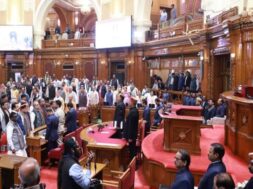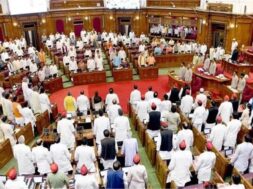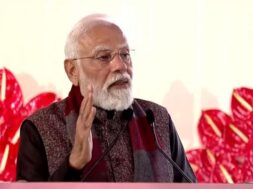
Virendra Pandit
New Delhi: With the People’s Republic of China (PRC) finding it difficult to fund its ultra-ambitious Belt and Road Initiative (BRI) any longer, America’s latest proposal to create a global alternative to BRI may force Beijing to invest beyond means, and quickly, to complete the mega-project—something that may bankrupt Beijing the way Ronald Reagan’s “Star Wars” projects forced Moscow to do likewise, and go bust.
Businessmen often use this trick to eliminate their potential rival: they make loud announcements, which panics their competitors to scramble investments, and then they quietly watch the rival tie itself up in knots, stew in its own juice, and finally go bust.
That is what then US President Ronald Reagan did. In the 1980s, he announced that America will make the fictional weapons displayed in Hollywood blockbuster Star Wars movies as real weapons. This prompted the panicked Soviet Union to spend beyond means on developing matching weaponry. Moscow turned bankrupt, and the Soviet Union was dissolved in the 1990s.
That President-for-Life Xi Jinping’s BRI dream is turning into a nightmare is an old hat now. Within seven years, China is huffing and puffing as it has invested heavily in the USD 3.7 trillion projects to connect over 100 countries across Asia, Africa, and Europe, but could complete only 20% of the 2,600-odd projects. In the Covid-19 inflicted economic downturn, Beijing now finds its investment into the ‘white elephant’ go waste, without hopes of any returns coming in in the foreseeable future. Even the BRI’s flagship project, the China-Pakistan Economic Corridor (CPEC) is facing rough weather and embarrassment.
This is where America has pierced the Dragon’s soft belly with a broken dagger. US President Joe Biden, who suggested to British Prime Minister Boris Johnson this week that nations may join hands to create a rival to BRI as an international project, is sure to panic China if and when the multinational project begins to shape.
In a recent phone call, Biden told Johnson that democratic countries should have an infrastructure plan to rival China’s BRI.
“I suggested we should have, essentially, a similar initiative, pulling from the democratic states, helping those communities around the world that, in fact, need help,” he told reporters.
President Jinping had launched China’s BRI with much fanfare as a multitrillion-dollar infrastructure scheme in 2013 involving development and investment initiative stretching from East Asia to Europe. China believed that BRI would significantly expand its economic and political influence. But it raised concerns in the US and elsewhere.
Biden’s remarks came after he said last week that he would prevent China from passing the US to become the most powerful country in the world. He also pledged to invest heavily to ensure the US prevails in the ever-growing rivalry between the world’s two largest economies.
He plans to unveil a multitrillion-dollar plan to upgrade US infrastructure soon. This would ensure increased US investment in promising new technologies, such as quantum computing, artificial intelligence, and biotechnology.
More than 100 starry-eyed countries had so far signed agreements with China to cooperate in BRI projects like railways, ports, highways, and other infrastructure. According to a Refinitiv database, as of mid-last year, more than 2,600 projects at a cost of $3.7 trillion were linked to the initiative, according to media reports.
However, China said last year that about 20 percent of BRI projects had been “seriously affected” by the coronavirus pandemic.
There has also been pushback against BRI from countries that have criticized projects as costly and unnecessary. Some countries also feared a debt-trap laid for them. Beijing scaled back some plans after several countries sought to review, cancel or scale down commitments, citing concerns about costs, erosion of sovereignty, and corruption, media reports said.
In 2019, the Trump administration had floated an infrastructure scheme, known as the Blue Dot Network, to vet projects and promote private sector-led infrastructure development in the Indi-Pacific Region.
Joe Biden may take it forward sooner than later.















